The Precision Water Management Lab at our institution is dedicated to optimizing agricultural practices through innovative research. We focus on advancing precision irrigation technologies such as variable rate irrigation (VRI) and sensor-based systems, aiming to enhance crop water productivity and environmental sustainability. Our research includes evaluating nitrogen fertilizer application methods on corn to improve yield and reduce water contamination, and developing integrated irrigation and nitrogen management strategies for staple crops like potatoes. Additionally, we assess the economic and environmental impacts of irrigation and nutrient best management practices (BMPs) on corn production in North Florida. Our work also extends to exploring the effectiveness of controlled release fertilizers in reducing nutrient leaching in sandy soils, and developing micro irrigation systems for strawberry production to conserve water and reduce runoff. By integrating cutting-edge technologies such as remote sensing and artificial intelligence, our lab not only aims to improve on-farm irrigation and fertilizer management but also supports the development of policies and practices that safeguard natural resources and promote sustainable agriculture in Florida.
Integrated Irrigation and Nitrogen Management for Potatoes
Title: Development of Integrated Precision Irrigation and Nitrogen Management Strategies for Potatoes.
Gallery
Potato is one of the most important crops in Florida, with approximately 30,000 acres which are vital to the state’s economy. Most of these acres managed under sandy soils with a shallow water table and sub-surface (seepage) irrigation systems. With increasing pressure on water resources and declining water quality, precision irrigation management practices such as sprinkler irrigation are being promoted to reduce adverse environmental impacts and maintain crop productivity. Although extensive work has been done to optimize nitrogen management in potatoes, the combined effects of irrigation and nitrogen management on potato yield and nitrate leaching under sprinkler irrigation have not been investigated thoroughly.
Therefore, in this project the University of Florida aims to identify and develop irrigation and nitrogen management strategies and techniques for potatoes under sprinkler irrigation systems that will increase crop water and nitrogen use efficiency (CWUE) while minimizing nitrate leaching without impacting crop yield. We will compare three irrigation and five fertilizer strategies, including control release fertilizer treatment. The outcomes of this research will provide data and information that will help farmers to make better on-farm management decisions and provide opportunities for the researchers to develop collaboration to advance the sensor-based irrigation and nitrogen management studies and help government agencies to develop irrigation and nutrient management policies based on scientific research.
Irrigated agriculture constitutes the greatest consumptive water use globally, accounting 70% of current surface and groundwater withdrawals and contributing 40% of the total food production worldwide. However, in recent years have seen a significant shift (20-40%) of water resources to other sectors to support economic growth, which puts enormous pressure on agricultural water resources. At the same time, irrigated agriculture is one of the largest contributors of agricultural nitrate (N) leaching and runoff to groundwater and surface waterways. So, enhancing irrigation use efficiency measures are an important part of global efforts to best utilize this limited resource, both environmentally and economically.
This project will demonstrate the feasibility of integrated precision irrigation management systems [i.e., variable rate irrigation (VRI) system and multi-mode sensor systems] in managing on-farm irrigation scheduling and devise next-generation irrigation technology to enhance on farm crop water productivity.
Our overarching goal is to demonstrate a novel suite of existing easy-to-use and affordable technological solutions [VRI, soil electrical conductivity (soil EC), remote sensing, artificial intelligence (AI)] to stakeholders (producers, irrigation managers, commodity groups, and state agencies) that will help producers make better on-farm irrigation management decisions. Focusing on major regional cropping systems such as corn-peanut in Florida, corn-cotton in Georgia and corn-edible bean in Minnesota, a multi-disciplinary team of experts from University of Florida (UF), University of Georgia (UGA), and University of Minnesota (UMN) will collaborate to conduct on-farm demonstrations.
Addressing the challenges of agricultural water quantity and quality sustainability and environmental degradation requires the integration of precision irrigation and fertilizer technology-driven water-nutrient nexus concepts at both local and regional scales.
Advancements in precision agriculture technologies in the last two decades have enabled the site-specific application of water, fertilizer, and other field inputs such as chemicals to manage spatial and temporal variabilities within agricultural fields. Among existing techniques, variable rate, or site-specific irrigation (VRI) and fertigation (VRF) technology on a moving center pivot sprinkler irrigation system is an advanced and growing management tool that has been shown to have the potential for optimizing water use and nitrogen use efficiency.
The main goal of this proposal is to build research capacity to provide science-based data on integrated precision irrigation and nutrient management solutions and technologies (imaging sensors, IoT devices, and artificial intelligence/machine learning (AI/MC)). The project will provide science-based data on the potential of integrated VRI and VRF solutions to increase water and nutrient use efficiency, thereby increasing on-farm profitability and reducing the environmental impact of agricultural activities.
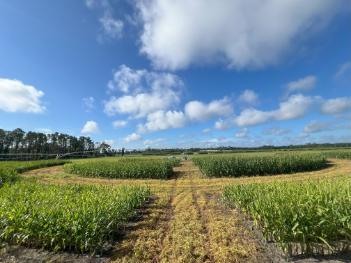
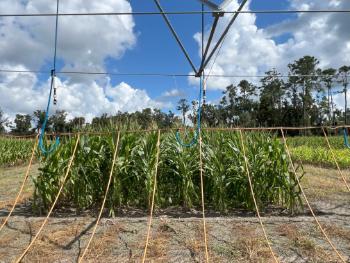
Nitrate-Nitrogen (NO3-N) leaching from agricultural fields is considered one of the major contributors to groundwater contamination and degradation of natural springs in Florida (FDEP, 2018). This is more prevalent in North Florida, where current more intensive agricultural practices over deep sandy soils which are hydraulically connected to underlying Karstic Upper Floridan Aquifer (UFA) have resulted in increasing NO3-N concentration in springs within the Suwannee River Basin (SRB). These water quality challenges have led the state and local governments in the development of Best Management Practices (BMPs) to reduce the Total Maximum Daily Load (TMDL) to nutrient losses while maintaining crop yield and competitiveness of farming operations.
Various BMPs, such as precision irrigation and fertilizer management have been proposed to reduce the nitrate leaching from agricultural fields. The 4R Nutrient Stewardship Framework promotes the application of nutrients using the right sources at the right rate, time, and place. In recent years, significant efforts have been made and are ongoing in Florida to evaluate the efficacy of the 4R approach; however, most of the research efforts were concentrated on fertilizer sources. The main goal of this study is to build capacity to provide scientific research-based precision N application and placement data and information on fundamental relationships that help farmers to make better on-farm management decisions for corn.
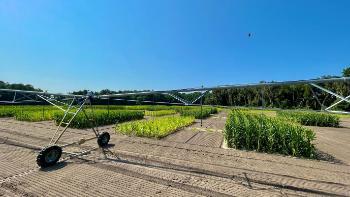
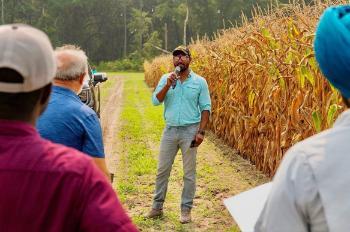
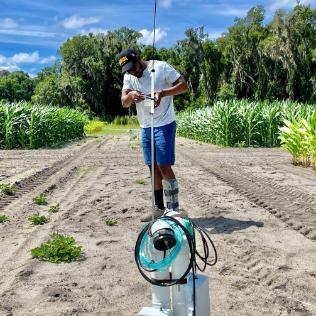
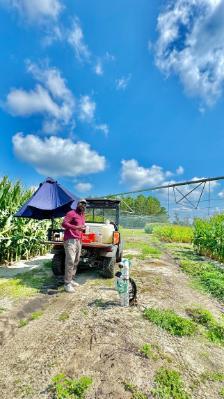
The Suwannee River Water Management District (SRWMD) encompasses portions of 15 counties in North Florida. Over 9,000 row crop and vegetable growers farm ~1.4 million acres in the area, of which 142,000 acres are irrigated (FSAID, 2015; USDA 2012 Census of Agriculture).
The majority of the agronomic and vegetable crop acreage of this region are found within the Suwannee River Basin, encompassing nine counties of the Water Management District. What distinguishes the area are its deep and rapidly draining sandy soils with large areas of unconfined Floridan aquifer, providing recharge for groundwater and springs. North Florida’s deep sandy soils are excellent for vegetable and row crops production but are also vulnerable to leaching nutrients, especially nitrogen.
This multi-year project will allow the project team to collect data on the use of controlled release fertilizer (CRF) to increase understanding of nutrient use efficiency and to facilitate producer’s use of CRF on three economically important crops to the region.
Irrigation is vital for the economic viability of individual producers in the Suwannee River Water Management District. Freshwater usage has been increasing in recent years, and water reserves are being reduced. Several actions, including Best Management Practices (BMPs), are in place to help mitigate the effects of irrigation and fertilizer application on the quantity and quality of water resources in Florida. However, with increasing costs of fertilizer along with fuel costs for irrigation and fertilizer application, the assessment of irrigation technologies has significant implications on farm economics and environmental sustainability. Such an approach would require (i) an evaluation of irrigation system types under similar soil and climatic conditions for different nutrient BMPs, and (ii) a regional analysis to determine the economic, environmental, and crop response impact with different irrigation systems.
The main goal of this study is to build capacity and collect baseline data and information on crop-performance, environmental impact, and economic evaluation of irrigation application technologies including Sprinkler Irrigation (lateral/center pivot), Sub-surface Drip irrigation (SDI), and Mobile Drip Irrigation (MDI) systems along with different nitrogen rates for corn production in North Florida.
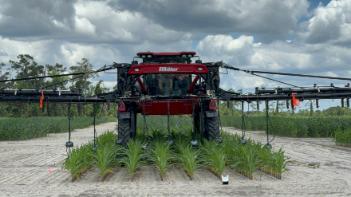
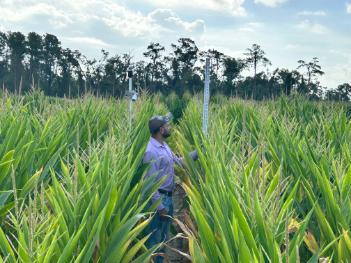
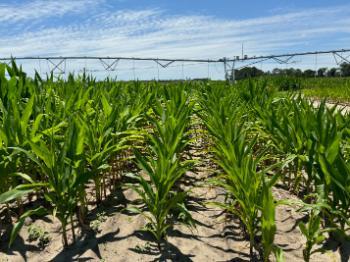

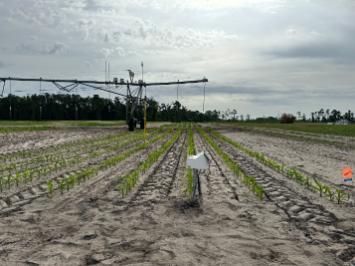
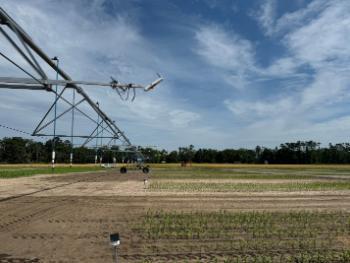
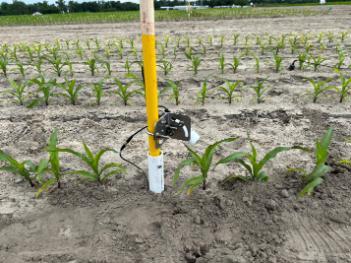
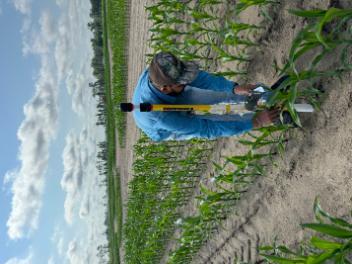

Nitrate-Nitrogen (NO3-N) leaching from agricultural fields is considered one of the major contributors to groundwater contamination and degradation of natural springs in Florida (FDEP, 2018). This is more prevalent in North Florida, where current more intensive agricultural practices over deep sandy soils which are hydraulically connected to underlying Karstic Upper Floridan Aquifer (UFA) have resulted in increasing NO3-N concentration in springs within the Suwannee River Basin (SRB). These water quality challenges have led the state and local governments in the development of Best Management Practices (BMPs) to reduce the Total Maximum Daily Load (TMDL) to nutrient losses while maintaining crop yield and competitiveness of farming operations.
Various BMPs, such as precision irrigation and fertilizer management have been proposed to reduce the nitrate leaching from agricultural fields. The 4R Nutrient Stewardship Framework promotes the application of nutrients using the right sources at the right rate, time, and place. In recent years, significant efforts have been made and are ongoing in Florida to evaluate the efficacy of the 4R approach; However, most of the research efforts were concentrated on fertilizer sources. The main goal of this study is to build capacity to provide scientific research-based precision N application and placement data and information on fundamental relationships that help farmers to make better on-farm management decisions for corn.
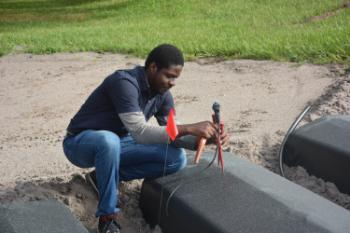
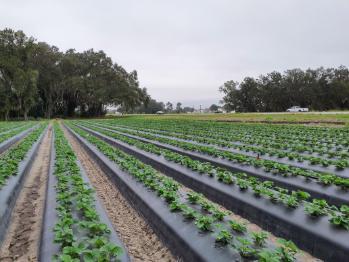
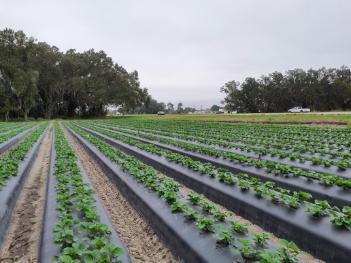


















-351x263.jpg)
-350x262.jpg)
-350x233.jpg)
-351x234.jpg)
-350x237.jpg)
-350x262.jpg)
-351x263.jpg)
-351x263.jpg)